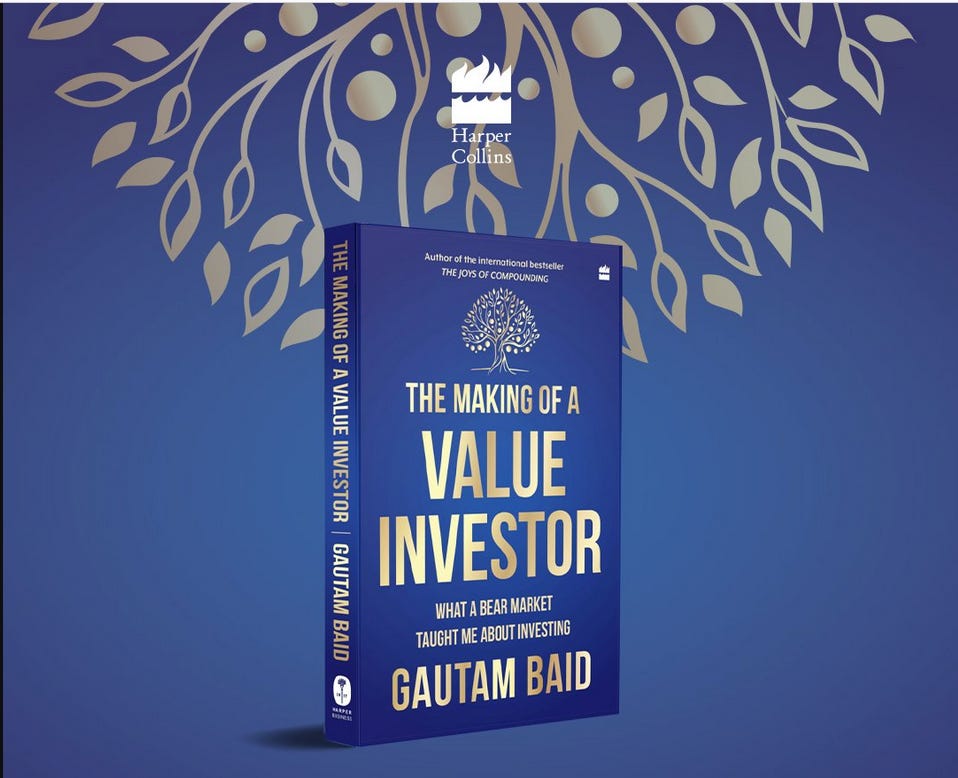The best kind of investor?
Someone who can do the average when everyone is going crazy.
Today we share an interview with Gautam Baid.
It will teach you how to think and act during a bear market.
"In bear markets, stocks return to their rightful owners." - J.P. Morgan
"A bull market is when you check your stocks every day to see how much they went up. A bear market is when you don't bother to look anymore." - John Hammerslough
The Making of a Value Investor
The reason we’re writing about how to survive a bear market today?
Our friend Gautam Baid will publish his brand new book ‘The Making of a Value Investor’ tomorrow.
Gautam Baid and Compounding Quality had dinner in Omaha the day before the Berkshire Meeting in May 2023 and we’ve been friends ever since.
It’s great to learn from your own mistakes, but it’s even better to learn from other people’s mistakes.
You don’t need to pee on an electric fence yourself to know that it’s a stupid idea.
That’s exactly why Gautam’s book is a must-read. In his book, Gautam writes about how he experienced the last brutal bear market and how it formed him as an investor.
Interview Gautam Baid
Compounding Quality: Welcome Gautam. It’s nice to see you again. Your book ‘The Joys of Compounding’ is a fantastic read and has sold more than 100,000 copies. You’ve written a second book called ‘The Making of a Value Investor’. What’s the key takeaway from this book?
Gautam Baid: The key to success in investing is long-term survival.
How to survive? Make sure that you hold tennis balls (quality stocks) and not eggs (junk stocks) when you’re in the middle of a storm.
Quality investing is the way to go. You build wealth by investing in high-quality businesses led by high-quality managers. That’s the main thing I learned from the latest bear market.
When you combine investing in quality businesses with diversification and patience, beautiful things will happen.
Compounding Quality: What’s the main difference between reading about bear markets and experiencing one?
Gautam Baid: You can read a lot about stock market crashes, but experiencing one is totally different.
The key to making money in stocks is to not get scared out of them.
You must be present in the game for a very long time in order to win.
The most stupid investing mistakes are often made at the height of a bull market and the bottom of a bear market:
Panic buying in a bull market
Panic selling in a bear market
The key to success is to not take too much risk in a bull market and to not be too risk-averse in a bear market.
It takes a couple of cycles (bull- and bear markets) before you’ll become a disciplined investor.
Mentally prepare yourself for bear markets and be aware that you’ll make plenty of mistakes during your investment career.
Compounding Quality: What’s your key lesson from the latest bear market?
Gautam Baid: The latest bear market taught me two things:
I should focus more on capital preservation
No matter how well you prepare yourself, risk can always come from places you couldn’t even imagine
The only protection against unknown unknowns is diversification.
That’s why I try to diversify my portfolio to 20-25 stocks across different industries.
Compounding Quality: Did you suffer from self-doubt during the latest bear market? And how did you handle it?
Gautam Baid: I suffered from self-doubt for sure.
“Nothing seems to be working in this market. Maybe I am really just an average investor at best. Maybe I just got lucky in the past. Maybe this is the bear market talking inside me. I am not sure.” – Gautam Baid
It’s a very normal reaction.
I’d say that you just have to deal with it. You must take the short-term pain in order to get the long-term gain. Investing is all about delayed gratification.
What helped me was to not look at the stock prices of the companies I owned every single day. Instead, focus on the fundamentals and always think on the long term.
The only way you can survive a bear market is by being truly passionate about investing and stocks.
Compounding Quality: Warren Buffett defines his investment strategy as follows:
1. Buy wonderful businesses
2. Led by outstanding managers
3. Trading at fair valuation levels
How would you define your investment strategy?
Gautam Baid: In general, there are 2 kinds of companies:
Companies with a low ROCE
Companies with a high ROCE
Both kinds of companies can be good investments.
It’s important to understand that the first category (companies with a low ROCE) increase their intrinsic value per share the most by focusing on improving their ROCE.
In contrast, the second category (companies with a high ROCE) can increase their intrinsic value per share the most by focusing on revenue growth.
When a company can grow its earnings while improving its ROCE, multibaggers are created.
My portfolio consists mainly of the second category (high ROCE quality stocks). These companies are often active in a structural trend and are preferably operate in a (quasi-)monopoly.
Compounding Quality: What’s a common investing rule you don’t agree with?
Gautam Baid: That you can’t buy a stock at high valuation levels and do well as an investor over time.
You can achieve satisfactory results when you buy a stock at high valuation levels.
It all depends on which stage of the growth cycle the business is located. If it’s still in the early phase and the company can grow exponentially, it can be justified to pay a high valuation multiple.
Compounding Quality: What would you do differently if you could start all over again today?
Gautam Baid: I wouldn’t invest as much in cyclicals, commodities, and microcaps anymore.
Furthermore, I wouldn’t concentrate my portfolio to only one or a few sectors.
I believe that a great portfolio consists of a combination of small-, mid-, and large caps diversified across different sectors.
Compounding Quality: That’s great advice. Are there any books you’d like to recommend to our audience?
Gautam Baid: For sure. Just like you, I love to read. I’d like to recommend 3 investing books and 3 non-investing books.
Investing books:
Investing for Growth by Terry Smith
Capital Returns by Edward Chancellor
You Can Be a Stock Market Genius by Joel Greenblatt
Non-investing books:
Seeking Wisdom by Peter Bevelin
Poor Charlie’s Almanack by Peter Kaufman
More than You Know by Michael Mauboussin
Compounding Quality: Lovely recommendations. Where can people buy your new book ‘The Making of a Value Investor’?
Gautam Baid: The easiest way would be to buy it on Amazon.
I hope that your readers will enjoy the book and that it helps them to survive the next bear market.
Book Snippets
I had to honor to proofread Gautam’s book.
Here are some interesting takeaways from The Making of a Value Investor:
The key to success in investing is long-term survival
Invest in high quality-businesses led by high-quality managers to survive
The key to making money in stocks is to not get scared out of them
The only protection against unknown unknowns is diversification
The greatest learning always come from a bear market, and these lessons bear fruits for an entire lifetime.
Never let a good bear market go to waste.
Always avoid leverage, shorting and derivatives
A study of past manias and crashes should be part of every investor’s body of historical knowledge
In a bear market, good news is sold into, and bad news is hammered
It is always darkest before dawn. You can buy stocks for cheap during a crisis
You can order Gautam’s book here.
Whenever you’re ready
That’s it for today.
Whenever you’re ready, here’s how I can help you:








My friend and partner CQ,
Many, many thanks for the wealth of wisdom and invaluable advice shared during this captivating interview. I'm eagerly anticipating the book's release tomorrow and can't wait to purchase and delve into its contents.
Mr. Baid's prowess as both a writer and investor is truly remarkable! I'm already looking forward to the possibility of an introduction to him next year! ; )
Great interview! The question about the difference between reading about a bear market and experiencing one made me think of a Jason Zweig quote. "The difference between intellectually understanding that your portfolio could go down 50% and then actually experiencing it in real life is the same as showing a person a picture of a snake and then throwing a snake in their lap."
Looking forward to reading Gautam's new book as well!